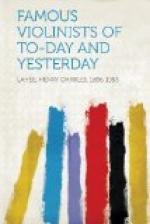Joachim’s early training and education developed his character both as a musician and as a man. The influence of Mendelssohn, whose friendship ended only with his death, of David, Schumann, Liszt, Berlioz, and Brahms, who was largely indebted to Joachim for the introduction of many of his works to the public, brought out the thorough uprightness, firmness of character and earnestness of purpose, and that intense dislike of all that is artificial or untrue in art, which have made him a great moral power in the musical world.
He combines in a unique degree the highest executive powers with the most excellent musicianship. Unsurpassed as a master of the instrument, he uses his powers of execution in the services of art, and represents the perfection of a pure style and legitimate school, with breadth and fidelity of interpretation. His performances undoubtedly derive their charm and merit from the strength of his talent and of his artistic character, and are stamped with a striking originality of conception; at the same time fidelity to the text, and careful endeavour to enter into the spirit and feeling of the composer, are the principles of executive art which Joachim has invariably practised.
In the rendering of Bach’s solos, Beethoven’s concertos and quartets, he has no rival, and for the revival of many great works the musical world is indebted to him. Of these, one instance may be cited, viz., the violin concerto (Op. 61) of Beethoven, which was first played by Clement, December 23, 1806. This concerto bears evidence of having been written in a hurry. Clement played it at sight without rehearsal, and, as a consequence of its being brought forward in such a slipshod manner, it was very seldom heard until its revival by Joachim. The MS. shows that the solo part was the object of much thought and alteration by the composer, but evidently after the first performance.
As a composer, Joachim has contributed work of value to the literature of the violin. His “Hungarian Concerto” is a creation of real grandeur, built up in noble symphonic proportions. Most of his works are of a grave, somewhat melancholy character, and all of them are marked by earnestness of purpose and a high ideal.
The jubilee of Joachim’s life as a violin player was celebrated in Berlin with great ceremony and with unusual honour, and in England a demonstration was made in his honour by the public, who subscribed a sum of about $6,000, with which was purchased an instrument of wonderful beauty, a celebrated “Red Strad,” which was presented to him at a public meeting held at the conclusion of the Monday Popular Concerts, in 1888.




